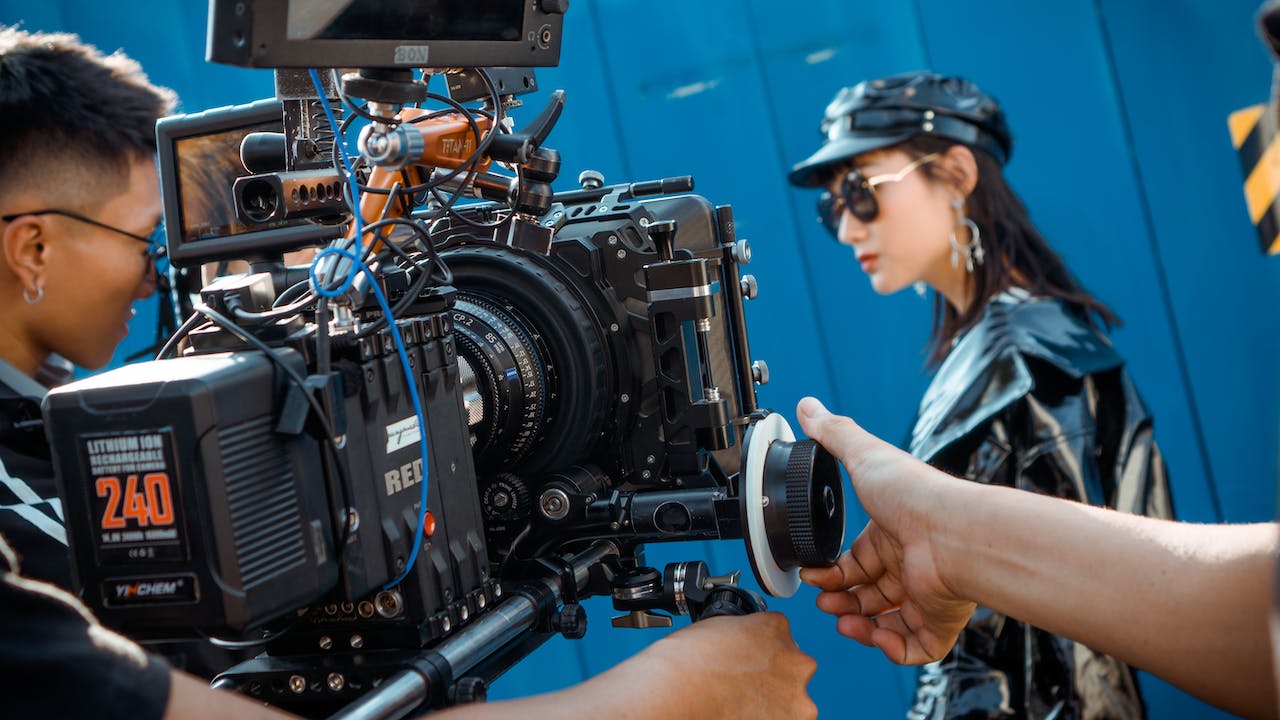B.I.S. Interdisciplinary Studies Program Map

Film Pathway
Film is the craft of storytelling through creatively combining writing, drawing, graphic and set design, performance, cameras, lights, sounds, and other digital technologies. The B.I.S. Film Pathway provides UWG students an opportunity to engage with and integrate knowledge and techniques of these multiple creative and technical fields in the intellectual and professional endeavor of Film.
Stats
60
Core Credit Hours
42
Major Credit Hours
18
Elective Credit Hours
- Plan Your Degree
- Crush Your Course
- Find Your Place
- Broaden Your Perspectives
- Connect Off-Campus
- Take Care of Yourself
- Pave Your Path
Plan Your Degree
Disclaimer: This program map is intended ONLY as a guide for students to plan their course of study. It does NOT replace any information in the Undergraduate Catalog, which is the official guide for completing degree requirements.
| Course Name | Credit Hours |
|---|---|
|
C1: ENGL 1101
English Composition I |
3 |
|
M: MATH Course |
3 |
|
I1: Written and Oral Communications |
3 |
|
S2: Social Science |
3 |
|
I2: Institutional Priorities |
2 |
Milestones:
-
Complete ENGL 1101 with C or better
-
Complete Core IMPACTS Math
| Course Name | Credit Hours |
|---|---|
|
C2: ENGL 1102
English Composition II |
3 |
|
F: FILM 2080
Intro to the Art of Film |
3 |
|
P2: POLS 1101
American Government |
3 |
|
T1: Science + Lab |
4 |
|
A: Humanities |
3 |
Milestones:
-
Complete ENGL 1102 with C or better
-
Complete lab science
-
Earn 16 credit hours (to reach 30 for Fall/Spring combined)
14 Fall Credit Hours + 16 Spring Credit Hours = 30 Credit Hours
| Course Name | Credit Hours |
|---|---|
|
F: PSYC 1101
Intro to Psychology |
3 |
| P1: HIST 2111 OR 2112
US History |
3 |
|
A: Humanities |
3 |
|
T2: Non-lab Science |
3 |
|
F: Film Track 1 Foundation Course |
3 |
| Course Name | Credit Hours |
|---|---|
|
F: XIDS 2000
Intro to Interdisciplinary Studies |
3 |
|
S1: HIST 2111 OR 2112
World History |
3 |
|
F: Elective
1000/2000 level Elective |
3 |
|
F: Film Track 2 Foundation Course |
3 |
|
T3: STEM Course |
3 |
Milestone:
- Initiate BIS Degree Plan
15 Fall Credit Hours + 15 Spring Credit Hours = 30 Credit Hours
| Course Name | Credit Hours |
|---|---|
|
Film Track 1 Course
(Course from Approved List) |
3 |
|
Film Track 2 Course
(Course from Approved List) |
3 |
|
Elective
3000/4000 level elective course |
3 |
| Elective
3000/4000 level elective course |
3 |
|
Elective |
3 |
| Course Name | Credit Hours |
|---|---|
|
Film Track 1 Course
(Course from Approved List) |
3 |
|
Film Track 2 Course
(Course from Approved List) |
3 |
|
XIDS 3000
Interdisciplinary Methods |
3 |
|
Georgia Film Academy Course OR Electives |
6 |
Milestones:
-
Complete BIS Degree Plan and submit to registrar
-
Finish Capstone proposal/plan in XIDS 3000
15 Fall Credit Hours + 15 Spring Credit Hours = 30 Credit Hours
| Course Name | Credit Hours |
|---|---|
|
Film Track 1 Course
(Course from Approved List) |
3 |
|
Film Track 2 Course
(Course from Approved List) |
3 |
|
Elective
3000/4000 level elective course |
3 |
|
Georgia Film Academy Course OR Electives |
6 |
| Course Name | Credit Hours |
|---|---|
|
XIDS 4000
Interdisciplinary capstone |
3 |
|
Elective
3000/4000 level elective course |
3 |
|
Elective
3000/4000 level elective course |
3 |
|
Georgia Film Academy Course/Internship OR Electives |
6 |
Milestone:
-
Complete Capstone Project, submit in XIDS 4000
-
Complete Georgia Film Academy Certification (optional)
15 Fall Credit Hours + 15 Spring Credit Hours = 30 Credit Hours
Crush Your Course
First Year:
- Make sure to take XIDS 2000: Introduction to Interdisciplinary Studies to start your intellectual, boundary-crossing journey!
- Discover your interests in your core classes. These can help you establish your disciplines.
Middle Years:
- Work with your IDS professors in XIDS 3000 to establish your degree plan, including identifying your complex problem and exploring how and what disciplines can help inform your inquiry.
Last Year:
- This is the time for your XIDS capstone! Make sure you have 9 hours of 3000-4000-level coursework for each of your two disciplines!
Find Your Place
First Year:
- Check out UWG’s Academic Transition Programs and take a cornerstone course (XIDS 2002).
- Explore events, clubs, and organizations available to you! Let the program and/or disciplines you’ve identified guide your search.
- Visit the Office of Undergraduate Research.
Middle Years:
- Attend UWG Scholars’ Day.
- Check out what university associations and community organizations relate to your disciplines.
Last Year:
- Hone your leadership skills by mentoring new IDS majors!
- Consider running for an officer position in a student organization.
Broaden Your Perspectives
First Year:
- Check out the education abroad office.
Middle Years:
- Consider a study abroad program. Check out students’ stories of their experiences.
Last Year:
- Assess your cultural competency.
- Consider working abroad and research visa regulations.
- Explore practices of creating more inclusive careers.
Connect Off-Campus
First Year:
- Visit Wolves Vote to learn about the voting process and registration.
- Consider volunteering for a campaign or organization in your community.
Middle Years:
- Complete an internship in your field.
- Consider a summer or part-time job.
- Ask your department about networking opportunities with alumni.
Last Year:
- Ask for advice from professionals in your field of interest.
- Explore career shadowing opportunities.
Take Care of Yourself
First Year:
- Visit Health Services.
- Get fit! Visit URec to see all your options.
- Visit the Center for Economic Education and Financial Literacy.
Middle Years:
- Take a fitness class, climb the rock wall, or join an intramural team.
- Consider whether counseling is right for you: take a mental health screening.
Last Year:
- Explore a farmer’s market for fresh produce.
- Develop a post-graduation exercise plan.
- Explore your loan repayment options and complete your exit counseling.
Pave Your Path
First Year:
- Complete a self-assessment to see what careers and majors are right for you.
- Visit Career Services.
- Create your profile on Handshake.
- Consider applying for an on-campus job.
Middle Years:
- Draft your resume and attend a resume blitz.
- Learn about how to network on social media and update your Handshake profile.
- Draft your personal statement.
- Visit the graduate school to find out about graduate programs and admission requirements.
Last Year:
- Request references from professors and supervisors.
- Draft your resume cover letter and personal statement and revise it with career services.
- Attend business fairs and career fairs at UWG and across the state.
- Attend an interview workshop.
- Apply for graduate programs.
Careers

Career Opportunities
This degree may help you get work as the following:
-
Costume Designer
-
Directing and Producing
-
Film Communications/ Marketing
-
Film Researcher/Archiver
-
Film/TV Critic
-
Production Designer
-
Screenwriter
-
Sound Designer
-
TV and/or Film Actor
-
University Teacher
Requirements

Degree Requirements
IDS MAJORS
All IDS majors complete an XIDS course sequence through which they learn interdisciplinary concepts and method, culminating with a capstone project that reflects their intellectual and career interests:
- XIDS 2000 - Introduction to Interdisciplinary Studies
- XIDS 3000 - Interdisciplinary Methods
- XIDS 4000 - Interdisciplinary Capstone
Pathway Requirements
Pathway Requirements
Foundation Courses
- Required: At least two, depending on selected tracks (see below)
- Strongly recommended for all Film tracks: FILM 2100 - History and Theory of Film
Film Tracks:
Students in the Film Pathway select at least two of the following tracks:
Art & Lens-Based Media
Foundation:
- ART 1006 Design I (2D) (Required)
- ART 1007 Drawing I (Required)
Upper Level:
- Art 3701 Introduction to Photography (Required)
Choose any two:
- ART 3704 Intro to Time-Based Media/Video I
- ART 4702 From Still to Moving Images
- ART 4007 Digital Media for the Artist
Mentor: Dr. Mark Schoon
Critical Studies
Foundation:
- FILM 2080 Intro to the Art of Film
- FILM 2100 History and Theory of Film
Upper Level: (Choose any three)
- ENGL 4109 Film as Literature
- COMM 3356 Film and Culture
- FILM 4081 Independent Study
- PHIL 3160 Philosophy in Literature and Film
- GRMN 4220 German Culture through Film
- FREN 4200 French Film Internship
- FREN 4210 French Literature and Film
- SPAN 4200 Hispanic Film & Literature
Mentor: Dr. Karen Dollinger
Performance
Foundation:
- THEA 2491 Acting for the Camera
- THEA 2292 Contemporary Scene Study
- THEA 2291 Developing a Character
Upper Level:
- THEA 3491 Advanced Acting for the Cinema (Required)
Choose any two
- THEA 3391 Acting Shakespeare
- THEA 3392 Period Scene Study
- THEA 4291 Advanced Voice
- THEA 4412 Business of Acting
- THEA 3415 Devised Theatre
Mentor: Dr. Jonathan Kitt
Production
Foundation:
- COMM 1154 Intro to Mass Communication
Upper Level:
- COMM 3553 Fundamentals of Film (Required)
Choose any two
- COMM 4405 Sound Design
- COMM 4406 Digital Cinematography & Image Design
- COMM 4407 Film & Video Post-Production
- COMM 4408 Producing Film & Video Production
- COMM 4425 Documentary Practices
Mentor: Dr. Deon Kay
Production Design
Foundation:
- THEA 2214 Concepts in Theatre & Film Design
- THEA 2224 Drafting and CAD
Upper Level: (Choose any three)
- THEA 3201 Stage and Film Craft II
- THEA 3212 Period Styles in Design
- THEA 3214 Scenic Design
- THEA 3215 Lighting Design
- THEA 3290 Costume Design
- COMM 4405 Sound Design
Mentor: Dr. Alan Yeong-Marcello
Screenwriting
Foundation:
- ENGL 2060 Intro to Creative Writing
Upper Level:
- ENGL 3200 Intermediate Creative Writing (Topic: Screenwriting) (Required)
Choose any two
- COMM 3305 Short Form Screenwriting & Analysis
- ENGL 3200 Intermediate Creative Writing (Different genre than screenwriting)
- ENGL 4210 Advanced Creative Writing (Topic: Screenwriting)
- THEA 3415 Playwriting I
- THEA 4415 Playwriting II
Mentor: Dr. Alison Umminger
HeadingSub-Heading
Have any questions about your major?
Don't forget to check out Wolf Watch to explore degree requirements!
